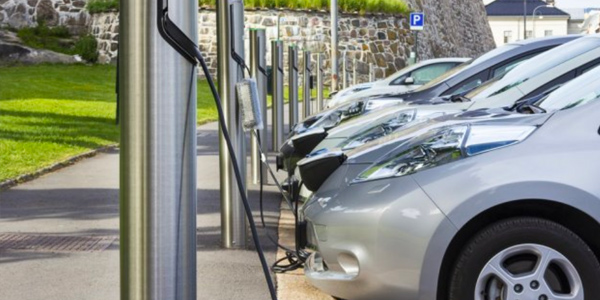California Gov. Gavin Newsom issued an executive order Wednesday that will prohibit the sale of all gasoline-powered automobiles in the state by the middle of the next decade.
The governor’s order will require that all new passenger cars and trucks sold in California be emissions-free by 2035, accelerating the state’s already ambitious goals of electrifying its transportation sector. The state currently has more than 725,000 EVs on the road and accounts for about 50% of the nation’s EV sales.
The move is expected to reduce statewide automobile emissions of greenhouse gases by 35% and NOx by 80%.
The order also directs the state’s Air Resources Board to develop regulations mandating that 100% of all operations of medium- and heavy-duty trucks be emissions-free by 2045, “where feasible,” with the mandate becoming effective in 2035 for all drayage trucks.
“This is the most impactful step our state can take to fight climate change,” Newsom said in a statement.
The transportation sector accounts for more than half of California’s carbon emissions, 80% of smog-forming pollution and 95% of diesel emissions, leaving the Los Angeles Basin and Central Valley with some of the dirtiest air in the country, the statement noted.
“For too many decades, we have allowed cars to pollute the air that our children and families breathe. Californians shouldn’t have to worry if our cars are giving our kids asthma,” Newsom said. “Our cars shouldn’t make wildfires worse — and create more days filled with smoky air. Cars shouldn’t melt glaciers or raise sea levels threatening our cherished beaches and coastlines.”
Newsom’s order requires state agencies to partner with the private sector to speed up deployment of “affordable fueling and charging options” and to ensure that all Californians have “broad accessibility” to EV markets. The order does not prevent residents from owning gasoline-powered cars or selling them on the used car market.
The governor’s office is assuming that zero-emission vehicles “will almost certainly be cheaper and better” than traditional vehicles by the time the rule goes into effect, according to the statement.
“The upfront cost of electric vehicles are projected to reach parity with conventional vehicles in just a matter of years, and the cost of owning the car — both in maintenance and how much it costs to power the car mile for mile — is far less than a fossil fuel-burning vehicle,” the statement said, citing a BloombergNEF study.
Newsom also positioned the move as an economic opportunity for the state and U.S. automakers. EVs are California’s second-biggest export, Newsom said during a press conference.
“If American manufacturers do not commit to zero emissions, they’re not going to be able to sell their cars globally. They’re not going to be able to sell their cars in China, in India, in Israel, in Ireland, [which] are also committed to similar goals that California is advancing,” Newsom said in a video posted on Twitter.
“This is about strengthening our competitiveness [and] encouraging more manufacturing jobs,” he said.
‘Strong Action’
Newsom’s order met with predictable praise from environmental groups.
“In the midst of a historic wildfire crisis, Gov. Newsom is taking strong action to protect California’s economy and the health of its people,” Environmental Defense Fund President Fred Krupp said in a statement. “His announcement today will not only address the single largest source of climate and air pollution in California, but is a major step toward boosting his state’s economic competitiveness and helping Californians who are suffering extraordinary harms from air pollution.”
Krupp added that the new rules will position California “to win a new generation of jobs building affordable zero-emission vehicles — jobs that Europe and China are also hoping to capture.”
“With this announcement, California has the opportunity to be the center of the global clean transportation industry and once again to lead the nation in addressing climate change,” Annie Notthoff, California director of the Natural Resources Defense Council, said in a statement. “The past years of apocalyptic wildfires, record temperatures and droughts have made climate change and pollution all too real for everyone in the Western U.S. — most of all low-income households and communities of color.”
The move also sparked criticism.
Thomas Pyle, president of the American Energy Alliance, an advocacy group backed by fossil fuel producers, castigated the measure for allowing “bureaucrats in Sacramento” to make buying decisions that families should make for themselves.
“Right now, 97% of Americans decide to buy a car with an engine powered by gasoline. They make that decision for all kinds of reasons, including safety, size, range, comfort and, in many instances, because an electric vehicle is too expensive,” Pyle said in a statement. “The governor knows that today’s engines are cleaner, more efficient and more powerful. He also knows that there is no such thing as an environmentally perfect vehicle. This is not only a bad idea, and a bad deal for the state of California, it’s insulting to consumers and families.”





